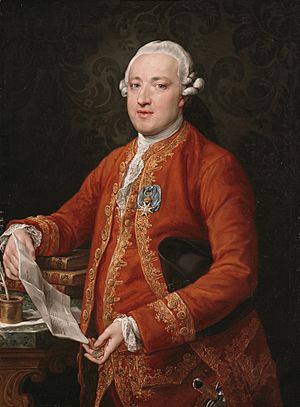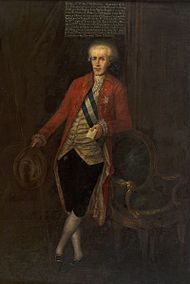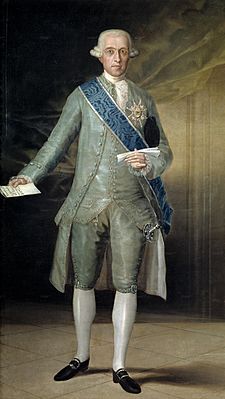José Moñino, 1st Count of Floridablanca facts for kids
Quick facts for kids
The Most Excellent
The Count of Floridablanca
|
|
|---|---|

Portrait by Pompeo Batoni, c. 1776
|
|
| Chief Minister of Spain | |
| In office 19 February 1777 – 28 February 1792 |
|
| Monarch | Charles III Charles IV |
| Preceded by | Jerónimo Grimaldi, 1st Duke of Grimaldi |
| Succeeded by | Count of Aranda |
| Personal details | |
| Born | 21 October 1728 Murcia, Kingdom of Spain |
| Died | 30 December 1808 Seville Andalusia Kingdom of Spain |
José Moñino y Redondo, 1st Count of Floridablanca (born October 21, 1728 – died December 30, 1808) was an important Spanish leader. He was the main minister for King Charles III of Spain, who wanted to make many changes. He also worked for a short time under King Charles IV. Many people think he was one of Spain's most effective leaders in the 1700s. In Spain, he is simply known as Conde de Floridablanca.
Contents
Early Life and Career
José Moñino y Redondo was born in Murcia, Spain, in 1728. His father was a retired army officer. José studied in Murcia and Orihuela, then went on to study law at the University of Salamanca. He became a respected lawyer in the Spanish courts.
In 1766, he became a government lawyer in Castile. That same year, he was asked to investigate the Esquilache Riots, which were big protests. He became known for supporting the king's plans to make changes. He also supported the decision to remove the Jesuits (a religious group) from Spain in 1767.
The main minister at the time saw how talented Moñino was. In 1772, Moñino became Spain's ambassador to Pope Clement XIV. He was given the special title "Count of Floridablanca" in 1773. This was because he successfully convinced the Pope to support the removal of the Jesuits.

Leading Spain as Chief Minister
Floridablanca became the chief minister of Spain in 1777. He started a big plan to improve how the government worked. In 1787, he created a true cabinet, which was like a team of ministers working together.
He also made important changes for Spain's economy and education:
- In 1778, he allowed more freedom for trade in the American colonies.
- In 1782, he helped create the National Bank of San Carlos, which was a major bank.
- He worked to improve universities in Spain, which had become less effective over time.
- After the Jesuits were removed, many schools needed new teachers. Floridablanca helped hire new staff and updated teaching methods. He also opened new schools across Spain.
- During his time, much of Madrid was rebuilt and improved. He also made the police force in Madrid better and encouraged public works projects in the city.
Spain and the American Revolution
As the person in charge of Spain's foreign policy, Floridablanca wanted to make Spain's economy stronger. He made trade deals with Morocco and the Ottoman Empire. He believed that having good relations with Great Britain was important for Spain's growth.
Despite this, he was reluctantly drawn into the American War of Independence. Spain joined the war on the side of France and the American rebels. The war generally went well for Spain. Floridablanca helped Spain regain much of its respect. In 1782, Britain returned the island of Menorca and Florida to Spain. However, attempts to capture Gibraltar, Jamaica, and invade Britain were not successful.
During the war, Spain tried to make a separate peace deal with Britain, even though it was allied with France. These talks did not work out. Spain eventually signed the Peace of Paris in 1783, which ended the war.
Long-standing disagreements with Portugal over the American colonies were also settled under Floridablanca. As a result, Spain gained Fernando Pó, Annobón, and Río Muni (which is now Equatorial Guinea) from Portugal. Floridablanca worked to make Spain's foreign policy more independent, moving the country away from being too close to France.

Responding to the French Revolution
When the French Revolution began in 1789, the movement for more freedom in Spain, which Floridablanca had supported, suddenly stopped. Floridablanca had to react to this new situation. He supported the First Coalition, which was a group of countries against revolutionary France. The events in France made people at court less trusting of reformers. This led to their downfall in the years that followed.
Later Years and Legacy
Floridablanca's policies, which focused on a strong central government, sometimes caused problems with different regions in Spain. He often disagreed with the Aragonese group at court, who wanted to keep their traditional freedoms from the central government.
This Aragonese group, supported by the queen's friend Manuel de Godoy and the Count of Aranda, managed to remove Floridablanca from power in 1792. He was accused of wrongdoing and imprisoned at the castle of Pamplona for three years. He was released only after his brother stepped in to help. He was found innocent in 1795, but the experience was very hard on him. He then retired to his estates.
When Napoleon attacked Spain in 1808, many people called for Floridablanca to lead the country in fighting back. He accepted and became the President of the Supreme Central and Governmental Junta. However, he was 80 years old, and his health failed him. He died in Seville on November 20 of that year.
Even though he was a very active statesman, he did not write many books. Only a few short papers by him on law were published during his lifetime. The plant group Monnina was named after him.
See also
 In Spanish: Conde de Floridablanca para niños
In Spanish: Conde de Floridablanca para niños
- List of prime ministers of Spain
- List of Spanish regents
 | William Lucy |
 | Charles Hayes |
 | Cleveland Robinson |

